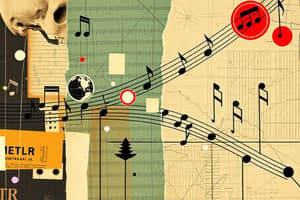Podcast
Questions and Answers
What does the top number in a time signature represent?
What does the top number in a time signature represent?
- The number of measures in the music piece
- The total number of beats in a measure (correct)
- The tempo of the piece
- The type of note that receives one beat
Which of the following is an example of a compound meter?
Which of the following is an example of a compound meter?
- 2/4
- 6/8 (correct)
- 3/4
- 4/4
In standard music notation, what does a 4/4 time signature indicate?
In standard music notation, what does a 4/4 time signature indicate?
- Four half notes per measure
- Four quarter notes per measure (correct)
- Four eighth notes per measure
- Four whole notes per measure
What characterizes the first beat of a measure in musical meter?
What characterizes the first beat of a measure in musical meter?
Which of the following statements about irregular meters is true?
Which of the following statements about irregular meters is true?
Which time signature is commonly used for waltzes?
Which time signature is commonly used for waltzes?
Meter in music only affects the tempo of a piece.
Meter in music only affects the tempo of a piece.
In 4/4 time, there are _____ beats per measure.
In 4/4 time, there are _____ beats per measure.
Match the time signature with its characteristics:
Match the time signature with its characteristics:
What is the function of meter in music?
What is the function of meter in music?
Different time signatures can create different rhythmic patterns.
Different time signatures can create different rhythmic patterns.
Name one common note value used in music.
Name one common note value used in music.
Flashcards
MAPEH
MAPEH
Music, Arts, Physical Education, and Health; a combined subject area focused on the arts, physical activity, and health.
Music Meter
Music Meter
The organized grouping of beats into measures in music.
Time Signature (Music)
Time Signature (Music)
Notation showing the meter of a piece; usually two numbers (e.g., 4/4).
4/4 Time Signature
4/4 Time Signature
Signup and view all the flashcards
Compound Meter
Compound Meter
Signup and view all the flashcards
What does MAPEH stand for?
What does MAPEH stand for?
Signup and view all the flashcards
What is Meter in music?
What is Meter in music?
Signup and view all the flashcards
What does a Time Signature tell us?
What does a Time Signature tell us?
Signup and view all the flashcards
What is Beat in music?
What is Beat in music?
Signup and view all the flashcards
What are rhythmic values?
What are rhythmic values?
Signup and view all the flashcards
Study Notes
MAPEH
- MAPEH stands for Music, Arts, Physical Education, and Health. It's a subject area that combines the study of the arts, physical activity, and health.
- Often, these subjects are integrated and taught simultaneously in an educational setting
Meter
- Meter in music refers to the organization of beats into groups called measures.
- Each measure has a consistent number of beats, and the rhythm of notes within the measure is determined by this.
- Common meters are duple (2 beats), triple (3 beats), and quadruple (4 beats)
- The first beat of each measure is often accented (stronger), creating a pulse.
- Meter is indicated by the time signature (e.g., 4/4).
Time Signature
-
The time signature is a musical notation that shows the meter of a piece of music.
-
It's written as two numbers stacked vertically (e.g., 4/4).
-
The top number (e.g., 4) indicates the number of beats in a measure.
-
The bottom number (e.g., 4) indicates the note value that receives one beat.
-
4/4 time: Four quarter notes per measure. A quarter note gets one beat.
-
3/4 time: Three quarter notes per measure. A quarter note gets one beat
-
2/4 time: Two quarter notes per measure. A quarter note gets one beat.
-
Time signatures can vary, introducing different rhythms and complexities. These may include:
- Compound meters (e.g., 6/8 time): These meters give a sense of triplets (three notes per beat).
- Irregular meters: These meters employ a varying number of beats per measure.
-
Understanding meter and time signature is crucial to reading and performing music accurately. It provides the framework for rhythm and tempo.
-
Different time signatures create different rhythmic feels and musical moods.
Studying That Suits You
Use AI to generate personalized quizzes and flashcards to suit your learning preferences.




